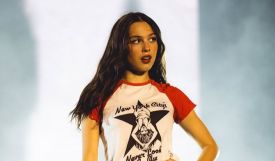Puerto Rico Is in Favor of Statehood: What Would Be Its Future?
Around 52 percent of Puerto Rican voters approved its statehood, while about 47 percent were against it.
This was the sixth time that Puerto Ricans had to vote for statehood.Independence and Commonwealth have been included in past plebiscites for Puerto Rican voters to choose, according to an ABC News report.
The island has been a United States territory since the Spanish-American War in 1898, when the relationship between Puerto Rico and the U.S. started.
Puerto Ricans who live in Puerto Rico cannot vote for president despite being U.S. citizens in name and passport.
Experts said the result of the vote was non-binding, and some expressed doubt it will affect Congress.
They also do not have voting representation in Congress and have been given a fiscal oversight board to repay their debts.
According to a We Are Mitu report, this pushed residents to the 23 percent unemployment rate, a much higher poverty rate than the incorporated states.
The United States still sees Puerto Rico as a commonwealth. However, many Puerto Ricans said the island is continuously treated as a colony.
The island's Resident Commissioner, Jenniffer González said this. González is a Republican. She noted that as a beacon of democracy globally, it sometimes gets ironic that the U.S. is fighting for equality and democracy, yet they get it in their own backyard.
González added that with more than 120 years, Puerto Ricans were never allowed to vote for president, Congress, or even have federal laws apply equally to American citizens on the island.
Foreseen Obstacles
With a new president elected to lead the White House, it is still unclear how much of a priority Puerto Rico would be if Democrats take control of both the White House and Congress.
Political scientist and researcher Carlos Vargas Ramos said that it is unlikely that Congress will take up the question of Puerto Rico as a state.
Ramos added that voter turnout in this referendum could still be an issue for Congress.
There were around 2.3 million eligible voters on the island, as per the election commissioner's counting. About 1.2 million people answered the statehood plebiscite.
"It's gonna be difficult for advocates of statehood to argue that this is a clear mandate to push for statehood, particularly when you have a Congress that is reluctant to take up the question," Ramos said in a report.
Puerto Rican statehood would mean Americans on the island could vote in federal elections, have quick access to federal aid in crisis, and gain full representation in Congress.
U.S. Rep. Darren Soto said that Puerto Ricans get treated in many ways like second-class citizens. Soto has launched his own bill setting forth a process of admission for the island.
Statehood for Puerto Rico would result in two new senators and four representatives to the House.
Currently, Congresswoman Alexandria Ocasio-Cortez is trying to push the Puerto Rican Self-Determination Act of 2020. The act would create a status convention deciding upon a long-term solution to the island's territorial status.
Subscribe to Latin Post!
Sign up for our free newsletter for the Latest coverage!
© 2026 Latin Post. All rights reserved. Do not reproduce without permission.















